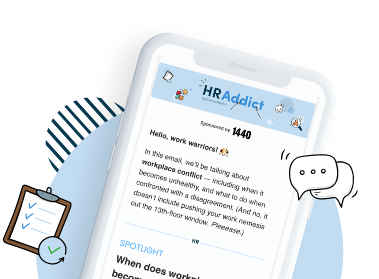This guest post includes sponsored content by Rockhurst University.
You’re scanning résumés, half-heartedly sipping your fourth cup of lukewarm office coffee, and then you see it: “Completed Master’s Degree in HR Management – Online.” You pause. Impressive? Sure. But is it the same as a traditional degree? Short answer? It might even be better.
Office culture is obsessed with buzzwords like “grit,” “resilience,” and “continuous learning.”
Yet, hiring candidates with online degrees sometimes makes recruiters skeptical. Are online degrees credible for hiring?
Evaluating online degrees in recruitment need not be complex. Because online degrees don’t just say “I studied.” They scream: I’m self-motivated, adaptable, and committed, even without a physical classroom, a student union, or free pizza.
But what more do online degrees reveal about today’s high-achieving professionals? And how can HR harness that insight to build more future-ready teams?
Below, we unpack the digital diploma.
TABLE OF CONTENTS
- The self-motivation behind the screen
- The human capital hidden in online credentials
- Continuous learning
- How online graduates thrive in workplaces
- Communication skills
- Leadership potential
- Hiring, promotion, and development
- Support & retention
- When online degrees aren’t a good fit
- Potential performance
The self-motivation behind the screen
Degrees earned at 2 a.m. speak volumes. Online learning isn’t about convenience; it’s a test of discipline.
Unlike traditional students who attend lectures at designated times, online learners juggle full-time jobs, manage family life, and still find time for coursework.
These learners are often mid-career professionals who want to upgrade their skills or pivot entirely to a more promising, high-paying career. They’re not doing it for the fun of cramming. They’re doing it because they have a goal in mind and the grit to see it through.
High-achieving employees share key traits like drive, accountability, and curiosity. Earning an online degree requires all three, in spades.
According to Rockhurst University, online graduate education programs enable professionals to upskill without pausing their careers and incomes. At the same time, they set the stage for addressing skill gaps in the workforce as a whole.
Online degrees are a strong signal that a candidate possesses autonomy and goal-orientation. More importantly, the patience and drive to reach that goal.
Enrolling in online education and leadership programs produces graduates versed in applied research and modern technologies. The career opportunities are countless.
In other words, when you see “online MBA” on a résumé, read it as: I know how to manage my time and my Netflix addiction.
Now let’s talk performance metrics.
The human capital hidden in online credentials
You’re not hiring skills, you’re hiring mindsets.
Online learners are driven by more than job titles. They want to grow. They’re signaling that learning is part of their brand. That’s powerful. Why?
Without continuous learning and practice, skills expire faster than avocado toast on a summer brunch. You need people who want to learn, not just people who once learned.
Forward-thinking HR leaders prioritize building the organization of the future. This is only possible with building teams hungry for growth.
Online graduates have already proven they don’t wait for permission or the perfect conditions to evolve. They just seize opportunities and go for it.
Continuous learning: From trendy buzzword to talent strategy
If “continuous learning” is the new black, online degree holders are wearing it head-to-toe.
Continuous learning is an ongoing development of skills and knowledge to remain competitive.
What’s key here is intentionality. Online students don’t wait for company-provided upskilling programs. They find them, enroll in them, and complete them while managing other life commitments.
That’s not motivation. That’s taking the initiative with ROI.
Top learning and development (L&D) programs emphasize self-paced content, flexibility, and autonomy. Sound familiar? That’s the online degree experience in a nutshell.
By hiring these candidates, you’re not only onboarding someone with current credentials; you’re onboarding a learning engine. And in 2025, that’s a win for your organization’s agility.
How online graduates thrive in hybrid and remote workplaces
We’re living in the age of remote-first work. And guess who’s been practicing that format for years? Yep, online grads.
They know how to collaborate without coffee machines or conference rooms. They’ve mastered digital communication tools, file-sharing systems, and remote group projects that make herding cats look easy.
Modern HR teams need to support development for hybrid teams and recognize alternative learning pathways.
Online education is no longer a Plan B. Sometimes, it’s the smartest route for developing talent.
And it’s not about tools. It’s about mindset. Online learners already understand how to self-manage, stay productive in fluid environments, and stay accountable without a micromanaging boss.
Which, let’s be honest, is a mood we all prefer.
The communication skills no one talks about
Oftentimes, we associate great communicators with public speaking or office charisma.
However, online education leans into written communication, discussion forums, emails, assignment submissions, and group messaging.
One of the biggest components of effective communication in HR isn’t tools but clarity. Online learners are trained to be clear, concise, and responsive in digital settings. Their entire academic success depends on it.
That’s gold for remote collaboration, async planning, and yes, those never-ending Slack threads.
If your team is struggling with “too many meetings” or “unclear emails,” online grads may be the low-drama communicators your workflow needs.
Let’s talk leadership potential
Leaders aren’t born. They're cultivated.
Here’s a not-so-fun fact: Many leadership courses remain geared toward in-person charisma and legacy metrics.
Yet, the modern leader? They’re quiet executors with digital empathy, strong writing skills, and a bias for action over optics. Online degrees tend to cultivate exactly these traits and skills.
Many online HR or business programs focus on applied leadership, emotional intelligence, and organizational behavior. These students aren’t cramming theory; they’re applying it in their real workplaces and in real-time.
They don’t wait for promotions to act like leaders. They’re already taking action like leaders.
What this means for hiring, promotions, and development
Look past prestige and focus on patterns.
It’s tempting to prioritize Ivy League degrees or brand-name universities. But prestige isn’t always predictive. Patterns are.
If you see someone who worked full time, raised a family, and earned an online master’s in their off hours, that’s not just a degree. That’s evidence of endurance, strategic planning, and practical wisdom.
These are the folks who take feedback well. Those who seek coaching. Those who view challenges as puzzles and catalysts for growth, instead of seeing them as punishments.
In short: They’re who you want on your team.
Supporting and retaining these employees
Spoiler: They still need growth.
Just because they’re self-motivated doesn’t mean they want to DIY forever.
The most successful HR development strategies involve mentorship, role mobility, and learning ecosystems. So when you hire an online grad, don’t treat them like they’ve “got it all figured out.”
They’re learners. Feed that.
Offer micro-learning. Sponsor certifications. Give them stretch assignments and access to leadership shadowing. Build clear, transparent pathways for career growth, and you’ll likely retain them longer than most.
Because here’s the kicker: While online grads can work independently, they stay longer when they feel supported.
When online degrees aren’t a good fit
Like all things in hiring, context matters.
If a candidate’s online degree is paired with vague work history, limited practical application, or poor communication skills, it’s fair to ask more questions. Did they gain value from the experience, or was it just a checkbox?
Look for evidence that they applied what they learned, like promotions, project leadership, and skills development. Results are non-negotiable when you’re looking for the best candidate, especially for a leadership role.
Ask how they balanced coursework with life and work, and how they handled the obstacles in their journey. Their answers will reveal a lot about their approach to challenges and change.
What online degrees reveal about potential performance
- Online degrees = proof of self-motivation. These professionals juggle life, work, and school, displaying discipline, time management, and serious drive.
- They’re continuous learners. Online grads don’t wait for upskilling opportunities. They seek them out, enroll, and follow through.
- Digital natives with leadership potential. They’re fluent in remote collaboration, asynchronous communication, and applying leadership theory in real-time.
- They thrive in hybrid workplaces. Online learning preps them for remote work dynamics, from managing deadlines to effective written communication.
- Growth-oriented mindset. Their educational journey signals resilience and adaptability, and the desire to continuously improve.
-
They’re self-starters. Retain them by feeding their growth. Self-starters need development, too. Mentorship, clear career paths, and L&D investments will keep them engaged.
Bottom line? An online degree isn’t a credential; it’s a character statement. HR leaders would be wise to take notice.
The digital diploma is the new grit test
Online degrees may lack ivy-covered walls and Latin phrases on the quad. They bring something arguably more important: evidence of resilience, discipline, and strategic ambition.
For HR professionals tasked with building future-proof teams, they’re a bright, blinking indicator that says: “I don’t wait to be told to grow, I already am.”
The next time you spot an online degree on a résumé, take a closer look. That candidate may be your organization’s next linchpin. Not because of the coursework alone, but because of what it took to finish it.
And if you’re still unsure? Ask them just one question: “What motivated you to pursue this degree online?”
Then sit back and listen. You’re not hearing about education. You’re hearing about character.

